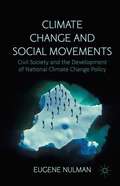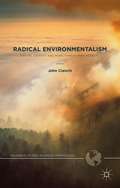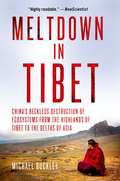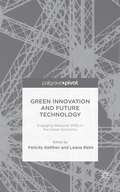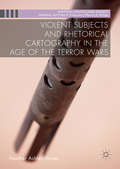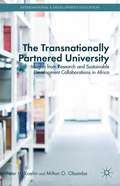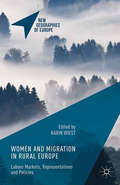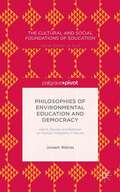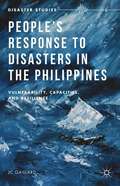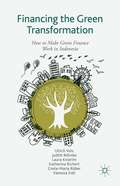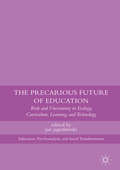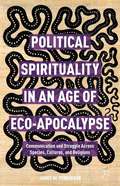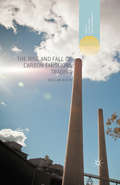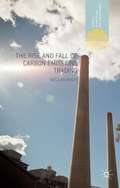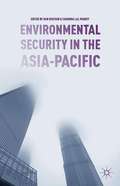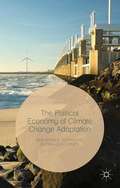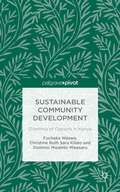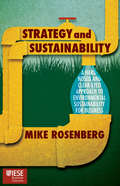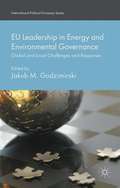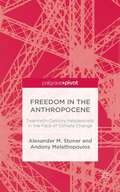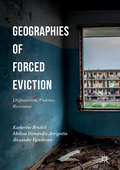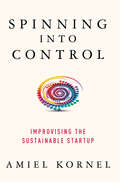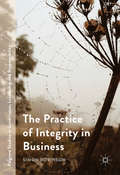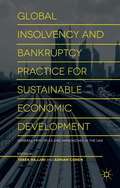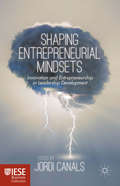- Table View
- List View
Climate Change and Social Movements: Civil Society and the Development of National Climate Change Policy
by Eugene NulmanClimate Change and Social Movements is a riveting and thorough exploration of three important campaigns to influence climate change policy in the United Kingdom. The author delves deep into the campaigns and illuminates the way policymakers think about and respond to social movements.
Radical Environmentalism: Nature, Identity and More-than-human Agency
by John CianchiEnvironmentalism is a contest about the meaning of nature and the social construction of activism, deviance and harm. The contests that are the subject of this book are fought on the margins, in spaces where what is deviant and what is criminal are fluid concepts. Forest activists engaged in Tasmania's old-growth forests, and Sea Shepherd Conservation Society activists campaigning in the Southern Ocean to protect whales tell powerful and moving stories about their encounters with nature. These are profound experiences that fundamentally alter how they understand themselves and their world. What emerges in this book is a perspective that recognises the personhood of non-humans and which gives rise to a strong moral obligation to defend nature from harm. Providing a unique account of environmentalism, one that highlights the voices of the activists and the nature they defend, Radical Environmentalism: Nature, Identity and More-than-human Agency will be of great interest to students and academics of green criminology, environmental sociology and nature–human studies more broadly.
Meltdown in Tibet
by Michael BuckleyTibetans have experienced waves of genocide since the 1950s. Now they are facing ecocide. The Himalayan snowcaps are in meltdown mode, due to climate change--accelerated by a rain of black soot from massive burning of coal and other fuels in both China and India. The mighty rivers of Tibet are being dammed by Chinese engineering consortiums to feed the mainland's thirst for power, and the land is being relentlessly mined in search of minerals to feed China's industrial complex. On the drawing board are plans for a massive engineering project to divert water from Eastern Tibet to water-starved Northern China. Ruthless Chinese repression leaves Tibetans powerless to stop the reckless destruction of their sacred land, but they are not the only victims of this campaign: the nations downstream from Tibet rely heavily on rivers sourced in Tibet for water supply, and for rich silt used in agriculture. This destruction of the region's environment has been happening with little scrutiny until now. In Meltdown in Tibet, Michael Buckley turns the spotlight on the darkest side of China's emergence as a global super power.
Green Innovation and Future Technology: Engaging Regional SMEs in the Green Economy
by Felicity Kelliher Leana ReinlThis book explores green innovation and future technology skill development within regional small to medium sized enterprises. Notwithstanding the goals of a greener Europe, there has been little debate as to how the skills required to fulfil the goals of sustainable development can be imparted within regions and within rural business communities.
Violent Subjects and Rhetorical Cartography in the Age of the Terror Wars
by Heather Ashley HayesThis work examines violence in the age of the terror wars with an eye toward the technologies of governance that create, facilitate, and circulate that violence. In performing a rhetorical cartography that explores the rise of the US armed drone program as well as moments of resistive violence that occurred during the Arab Spring directed at generating a counter-hegemony by Muslim populations, the author argues that the problem of the global terror wars is best addressed by a rhetorical understanding of the ways that governments, as well as individual subjects, turn to violence as a response to, or product of, the post September 11th terror society. When political examinations of terrorism are facilitated through understandings of discourse, clearer maps emerge of how violence functions to offer mechanisms by which governing bodies, and their subjects, evaluate the success or failure of the "War on Terror. " This book will be of interest to public policymakers and informed general readers as well as students and scholars in the fields of rhetoric, political theory, critical geography, US foreign relations/policy, war and peace studies, and cultural studies.
The Transnationally Partnered University
by Peter H. Koehn Milton O. ObambaAnalyzing the growing importance of the transnational higher education landscape and the role of African universities, Koehn and Obamba show how transnational partnerships among universities can inform policy, strengthen synergies between knowledge producers and knowledge users, and advance sustainable-development practice.
Women and Migration in Rural Europe: Labour Markets, Representations and Policies (New Geographies of Europe)
by Karin WiestFundamental societal changes in the globalising European countryside impact women's migration decisions. The chapters in this volume represent diverse attempts to explain women's movements from rural areas, taking prevailing labour market conditions as well as gender relations into account. Utilising empirical findings from countries including Austria, Germany, Hungary, Poland, Romania and Spain, this collection particularly aims to build bridges between research following the 'cultural turn' and functionalist explanations which refer to material and practiced ruralities. The international range of contributors to Women and Migration in Rural Europe focus on societal constructions of gender and rurality, and in doing so, address various female perspectives on rural life. The analysis of the different working and living conditions in different parts of rural Europe reveals distinct obstacles but also prospects for young women. Importantly, the book includes policy implications with respect to the challenges of demographic change, questions of gender equality and women's contribution to rural development.
Philosophies of Environmental Education and Democracy: Harris, Dewey, and Bateson on Human Freedoms in Nature
by Joseph WatrasThe project examines how three prominent philosophers of education - William Torrey Harris, John Dewey, and Gregory Bateson - each developed a world view that provides a philosophical basis for environmental education.
People’s Response to Disasters in the Philippines: Vulnerability, Capacities, and Resilience (Disaster Studies)
by Jc GaillardThis book provides a critical perspective on people's response to disasters in the Philippines. It draws upon an array of case studies to discuss people's vulnerability, capacities and resilience in facing a wide range of different hazards.
Financing the Green Transformation
by Ulrich Volz Judith Böhnke Vanessa Eidt Laura Knierim Katharina Richert Greta-Maria RoeberPlanetary boundaries and a scarcity of natural resources will require a significant boost of investment into clean and renewable energy and a more efficient use of resources in developing, emerging and advanced economies alike. In this context, the financial sector will have to play a key role in providing 'green finance' for sustainable investment and development. Against this backdrop, this book investigates the challenges for developing and emerging economies in enhancing green financingfor sustainable, low-carbon investment, using Indonesia as a case study. Based on surveys in the Indonesian banking and corporate sectors and expert interviews, the book devises innovative policy recommendations for governments to develop a framework conducive to fostering green investments.
The Precarious Future of Education: Risk and Uncertainty in Ecology, Curriculum, Learning, and Technology (Education, Psychoanalysis, and Social Transformation)
by Jan JagodzinskiThis volume examines the challenges weighing on the future of education in the face of globalization in the twenty-first century. Bringing together eleven authors who explore the paradox of an “after” to the future of education, each chapter in this book targets three important areas: ecology as understood in the broader framework of globalization and pedagogy; curriculum concerns which impact learning; and the pervasiveness of technology in education today.
Political Spirituality in an Age of Eco-Apocalypse
by James W. PerkinsonThis book 'hunts and gathers' across different historical epochs and situations, juxtaposing biblical materials and hip-hop, Christian colonialism and vodou, personal experience and racial politics, poetics and high theory. It is compelled by a desire to challenge the current crisis of sustainability from the point of view of indigenous communities and deep ancestry. Author James W. Perkinson ably synthesizes material from a diverse range of fields, including anarcho-primitivism, biblicalstudies, and history of religions in order to argue for a 'turn to indigeneity. ' The book's motive force is a deep concern for humanity's future in the face of eco-disasters like climate change and population overshoot as well as the compounding problems brought on by political economy calamities. Given the growing trend toward a turn away from institutionalized religious commitment and toward a more generalized and post-modern mix of practices and interests typically styled as 'spiritual,' the work proposes 'political spirituality' as a theme for investigation. Throughout the book, Perkinson raises the question: What does it really meant to be a human being? This query is posed not merely as a philosophical inquiry or existential musing, but as a personal and political conundrum arising from the overwhelming crises now engulfing our global reality. The book constitutes a poetic 'walk about' across quite different historical epochs and disparate contexts. Creatively foraging for indigenous memories and insurgent energies to help us live and cope in our modern state of unsustainability, the work aims to re-animate love of the wild and 'interspecies listening' for the sake of survival. The text articulates a deep suspicion toward our growing fascination with a kind of 'techno-messianism,' while nonetheless exploring some of the artistic innovations and meanings emerging from industrialization and digitalization.
The Rise and Fall of Carbon Emissions Trading (Energy, Climate and the Environment)
by Declan KuchThis book presents the results of the first full-scale emissions trading schemes in Australia and internationally, arguing these schemes will not be sufficient to 'civilize markets' and prevent dangerous climate change. Instead, it articulates the ways climate policy needs to confront the collective nature of our predicament.
The Rise and Fall of Carbon Emissions Trading (Energy, Climate and the Environment)
by Declan KuchThe Rise and Fall of Carbon Emissions Trading.
Environmental Security in the Asia-Pacific
by Iain Watson Chandra Lal PandeyEnvironmental security has been one of the greatest threats of the twenty-first century. Crossing the tipping point of two degrees Celsius is projected to be catastrophic, but perennial policy gridlock at the United Nations' multilateral climate change negotiations has so far prevented significant progress. The Asia-Pacific region has much at stake in these negotiations—it is often regarded as the most climate-vulnerable region in the world and also harbors the largest number of poorpeople already affected and in danger of being affected by climate change. Existing climate change literature frames issues through the prism of North-South relations. In contrast, this book focuses on both North-South and South-South relations to reveal an understanding of major climate change and climate change management issues through practices and narratives of environmental security in a specific regional context. The case studies are diverse and represent both large emitters like China and India and the smallest emitter, Nepal, as well as resource-cursed Indonesia, dilemmatic New Zealand, and green visionaries Korea and Japan. Contributors analyze causal interlinkages that affect environmental security policy from both geopolitical and geoeconomic dynamics.
The Political Economy of Climate Change Adaptation
by Benjamin K. Sovacool Björn-Ola LinnérThe Political Economy of Climate Change Adaptation.
Sustainable Community Development: Dilemma of Options in Kenya
by Fuchaka Waswa Christine Ruth Saru Kilalo Dominic Mwambi MwasaruCommunity development has lately gained much prominence, but the emphasis has remained on the economic and social welfare of communities, rather than the environment. By focusing on 'sustainable' development in Kenya, this study shows the importance of integrating ecological concerns in socio-economic and cultural development processes.
Strategy and Sustainability: A Hardnosed and Clear-Eyed Approach to Environmental Sustainability For Business (IESE Business Collection)
by Mike RosenbergBusiness and environmental sustainability are not natural bedfellows. Business is about making money; sustainability is about protecting the planet. Business is measured in months and quarters; sustainability often requires significant short term costs to secure a sometimes uncertain long-term benefit. To some activists, all executives are exploitative, selfish “1 percenters”. To some executives, all activists are irresponsible, unyielding extremists.And yet engaging with the issue isn’t optional – all businesses must have a strategy to deal with sustainability and, like any strategy, this involves making choices. Strategy and Sustainability encourages its readers to filter out the noise and make those choices in a hard-nosed and clear-eyed way. Rosenberg’s nuanced and fact-based point of view recognizes the complexity of the issues at hand and the strategic choices businesses must make. He blends the work of some of the leading academic thinkers in the field with practical examples from a variety of business sectors and geographies and offers a framework with which Senior Management might engage with the topic, not (just) to save the planet but to fulfil their short, medium, and long-term responsibilities to shareholders and other stakeholders.
EU Leadership in Energy and Environmental Governance: Global And Local Challenges And Responses (International Political Economy Series)
by Jakub M. GodzimirskiThis edited collection focuses on the impact of the changing global distribution of power on the EU's energy policy and ability to project its approach to energy-related issues abroad. It maps the EU's changing position on global energy, the impact of various factors on its energy policy, and its relations with Russia, China, the USA and Brazil.
Freedom in the Anthropocene: Twentieth-Century Helplessness in the Face of Climate Change
by Alexander M. Stoner Andony MelathopoulosFreedom in the Anthropocene illuminates the Anthropocene from the perspective of critical theory. The authors contextualize our current ecological predicament by focusing on the issues of history and freedom and how they relate to our present inability to render environmental threats and degradation recognizable and surmountable.
Geographies of Forced Eviction: Dispossession, Violence, Resistance
by Katherine Brickell Melissa Fernández Arrigoitia Alexander VasudevanThis book offers a close look at forced evictions, drawing on empirical studies and conceptual frameworks from both the Global North and South. It draws attention to arenas where multiple logics of urban dispossession, violence and insecurity are manifest, and where wider socio-economic, political and legal struggles converge. The authors highlight the need to apply emotional and affective registers of dispossession and insecurity to the socio-political and financial economies driving forced evictions across geographic scales. The chapters each consider the distinct urban logics of precarious housing or involuntary displacements that stretch across London, Barcelona, Rio de Janeiro, Shanghai and Colombo. A timely addition to existing literature on urban studies, this collection will be of great interest to policy makers and scholars of human geography, development studies, and sociology.
Spinning into Control: Improvising the Sustainable Startup
by Amiel KornelThis book encourages startup founders to maintain control of their destiny by obsessively perfecting their startup's story and key relationships as much as its initial product or service. It highlights the importance of improvisation in the incubation of startups. Startup founders hoping to master their destinies develop the skills of venture craftsmen, learning to behave more like explorers and artisans than managers and engineers. The improvisational arts of tinkering, wandering, and conversing overcome the limitations of scientifically based "lean" methodologies for creating startups. These skills provide wobbly, nascent ventures with stability and conserve momentum during early-stage incubation. Like the gimbals of a gyroscope, they counter the entropy born of change, conflict and confusion that is continuously pushing young enterprises towards chaos. As their startups spin, venture craftsmen actually loosen the coupling between command and control. Startup sustainability relies on relentless improvisation, the heart of the art of entrepreneurship. Vignettes in each chapter of Spinning Into Control relate hardscrabble stories of entrepreneurs, craftsmen and venturers -- some recently interviewed by the author, others historical -- recounting the challenges they faced, their responses, the lessons they learned, and the eventually triumphant outcomes.
The Practice of Integrity in Business (Palgrave Studies in Governance, Leadership and Responsibility)
by Simon RobinsonThis book explores the role of integrity in business and discusses why all leaders seek to have it. The author argues that it is less about ‘having’ integrity as an attribute, and more about practising it. The Practice of Integrity in Business examines how taking responsibility for ideas, values and practices, as well as accountability and wider creative responsibility for sustaining business, all contribute to the perceived integrity of an organization or business leader. Providing methods through which integrity can be learned, the author demonstrates the importance of practice, learning, dialogue and developing a narrative in forming the basis of trust. The book offers a view of integrity in which ideas, values and practice come together to make business and social sense, and to form the basis of mutual challenge and creativity.
Global Insolvency and Bankruptcy Practice for Sustainable Economic Development: International Best Practice
by Adrian Cohen Tarek HajjiriThis book is a comparative study of international practices in bankruptcy law, providing perspectives from a variety of specialisms including practitioners, lawyers, bankers, accountants and judges from the United Arab Emirates, the UK and Singapore.
Shaping Entrepreneurial Mindsets: Innovation and Entrepreneurship in Leadership Development (IESE Business Collection)
by Jordi CanalsCorporate innovation and entrepreneurship are more important than ever to create and sustain growth opportunities. This book deals with the challenge of how to speed up innovation and entrepreneurial initiatives to sustain corporate growth, by focusing on developing the necessary leadership competencies.
